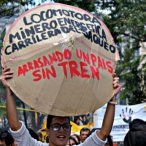English · Español

19 September 2016 | News | Water | Environment for Peace | Human rights | Extractive industries | Climate Justice and Energy | Social activists at risk
Transformation of the energy model for the building of peace with social and environmental justice
By CENSAT Agua Viva – Friends of the Earth Colombia
Download: MP3 (3.8 Mb)
A day after the announcement of the signing of an agreement in Havana between the Colombian government and the Revolutionary Armed Forces of Colombia (FARC), trade union organizations and social movements formally created the Social, Mining, Energy and Environmental Table for Peace, aiming to build peace within the territories, promoting permanence and good living without extractivism.
This took place on August 25, at the Gonzalo Jiménez de Quesada Auditorium in Bogota, capital city of Colombia, with the presence of men and women from different areas of the country, workers from the energy sector, people affected by dams, mining, and oil projects, human and environmental rights defenders, Labor Minister Clara López and the European Union Delegate for Colombia and Ecuador.
The aim in establishing this dialogue among workers and people affected in Colombia is historical, and key, because in addition to building proposals together with the participant sectors, the aim is to interact with energy-mining policy makers in Colombia with the goal to ensure a transformation oriented to a mining-energy policy that respects the life in the territory and attends to the challenges of progress and the good living, both in the countryside and the city.
These discussions have been a part of the struggles of popular movements and workers for decades. In fact, the Social Table was established in an emblematic day: August 25, a date that marks the 65th anniversary of the creation of Ecopetrol, the national oil company that was founded as a result of the struggles of the workers of the sector.
Furthermore, and most recently, the building of this space is based on the debates and the discussions held throughout the country during the Second Assembly for Peace “Territories with Energy, Building Peace for the Nation”, held in 2015, and organized by the Workers Union, the Labor Ministry and the National University of Colombia. This included the carrying out of 13 regional assemblies and 53 sub regional assemblies for peace, where over 10,000 people and 1,800 organizations participated. Finally, this deliberate exercise ended with the meeting of over 1,500 delegates around the country in 2015 in Bogota.
Broadly, these spaces have concluded that a thriving future for the country relies on transforming the energy mining model, where focus is given to energy transfer, where energy and water sovereignty and autonomy are promoted, as well as the community management of water and energy, ensuring the rights of workers and people affected, historical remedies for people affected, the strengthening of public companies, the right to water and energy, the promotion of energy alternatives, the recognition of nature rights, the redistribution of profits and the preservation of water sources. These are, among others, the proposals of this social dialogue space that also proposes tools, such as the creation of a national dam commission and an environmental truth commission.
These demands are present in the multiple demonstrations of organizations that defend territories, water, workers, peasants and environmentalists carry out throughout the country, against an energy-mining model that ignores the rich environmental, social and cultural diversity, the importance of our mountains, swamps, seas and savannas, our water wealth. These regional and national movements, from La Guajira to Putumayo, from Chocó to the Amazon forest, are demanding a change in the extractive model that loots the territories of ancestral peoples, as raised by the National Peasant, Ethnic and Popular Summit.
Giving priority to these proposals and others that stem from the Social, Mining, Energy and Environmental Table by the Colombian government is the path towards building peace in the territories.
This means to attend to the structural causes that have given way to several of the armed conflicts. This would avoid the emergence of more socio-environmental conflicts, that are neither convenient nor profitable for the country, based on the respect of the rights of human and non-human nature as part of the building of true integral peace, with environmental and social justice.
Living and permanence plans, among others, should be supported and respected by the Colombian State and inclusive decision making processes are the right path to build peace with social and environmental justice. Therefore, it is necessary to join the calls to citizen participation such as the popular consultation of Ibagué and at the same time to reject the criminalization and wave of murders against the defenders of the rights of workers and nature.







